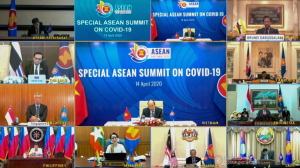Globally, the nations of the world continue to focus inward on their response to COVID-19. The national impact of the pandemic, experience, and policy responses have dominated airwaves throughout 2020. Yet despite so much attention on local action, regional responses will prove to be the key to recovery as countries attempt to reopen their borders to the movement of people and reinvigorate global supply chains.
Despite responding rapidly to the outbreak early in 2020, putting many protective measures in place even before the global pandemic was declared, the 10 ASEAN members have been hit hard by COVID-19’s multiple ripple effects. Southeast Asia’s economy relies heavily on tourism, manufacturing, international trade, and labor migration. It has seen not only a health crisis, but also profound economic disruption and an economic crisis unfold over the past 10 months. The multiple levels of movement restrictions from local lockdowns to closed borders have had dramatic consequences on people’s lives and livelihoods across the region.
Recognizing the crucial role of regional bodies in the response and recovery phase, the ASEAN Secretariat’s Socio-Cultural Community Department partnered with The Asia Foundation, The Rockefeller Foundation, and the Australian government to conduct a rapid assessment of the impact of COVID-19 on livelihoods across its 10 member states. The resulting assessment, released publicly this week, assesses the pandemic’s impact on people’s lives in three key sectors: labor, social protection, and education, with a view to what both the ASEAN regional institutions and national sectoral ministries can do to reduce the worst of those impacts and rebuild a region more resilient to future shocks. The analysis provided timely inputs as ASEAN was contemplating the development of a comprehensive recovery framework.
The analysis found that within ASEAN, the pandemic threatens to increase inequalities and to undo the region’s progress in tackling poverty over the past two decades. It suggests that, overall, if policy responses are not carefully crafted to reach vulnerable and marginalized groups, there is a risk that COVID-19 will deepen and entrench existing poverty and simultaneously push more people into poverty in ways that will be difficult to reverse. As the “new poor” find it increasingly difficult to make a living and support their families, many are struggling to access social welfare or insurance across multiple institutions and jurisdictions. Across Southeast Asia, millions of the region’s informal workers – particularly women – have been hit hard by the economic toll, while school closures have affected millions of students and their families, especially lower income ones. Many of the impacts have been unequal across populations. They presage greater inequities that may compromise future human capital and welfare.
While it is difficult to overstate the scope of the challenges ahead for the ASEAN region, there are opportunities to build back in a more equitable and sustainable manner. Through ASEAN, member states have an important platform to work together, drawing on the region’s collective resources and contributions from dialogue partners, to shape a new normal by investing in people.
The pandemic has galvanized collective action and community support across countries and regions. With a view to the future of work, and capitalizing on that momentum for change, ASEAN member states have an opportunity to address outdated labor laws to be more forward looking and inclusive. Even after the pandemic is managed, increasing investment in a social protection system can contribute to economic growth. Shock-responsive, adaptive social protection systems should be an essential element of social policy in the reimagined future, to ensure much greater resilience to future crises. Income support measures during a crisis can reduce the depth of a recession as well as the risk of escalating social tensions.
Given the scale of intra-regional labor migration upon which some ASEAN economies rely, migration policies should do more to protect migrant workers, both those that remain in the destination countries and those who return to their homes. Promoting the economic inclusion of the poor and vulnerable, including informal and migrant workers, will be critical for income generation and livelihood recovery. Institutionally, this will require greater coordination across social welfare, labor, health, and immigration ministries.
Beyond the member states themselves, regional recovery requires a collective regional effort. Cross-sectoral and cross-border measures are needed to accelerate the recovery of ASEAN tourism, for instance. Further research is needed on the impact on particular populations and their needs, and coordination of data collection is essential. Joint communications strategies would facilitate better engagement with residents and citizens on key issues such as social distancing, school closures, and safety regulations. And greater information sharing across the region, particularly among key government agencies, on impactful policies, lessons learnt, and joint research would empower those agencies to replicate good practices faster and more effectively.
As the situation rapidly changes, data gaps will continue to emerge. Building on its existing institutions and mechanisms, ASEAN countries should prioritize a combination of research response mechanisms, some of which can respond quickly, filling immediate data and knowledge gaps as they emerge, and some of which will start to track longer-term trends.
As the pandemic and its impacts span borders, working collaboratively across the region is more important than ever. Recognizing this, on November 12, the ASEAN Leaders adopted a Comprehensive Recovery Framework and Implementation Plan. Shaping the new normal will mean implementing that plan effectively. It will mean investing in people by preparing the region’s citizens for productivity and flexibility in the future post-COVID world. We have an unprecedented opportunity for systemic change – let’s use it.
Deepali Khanna is managing director of The Rockefeller Foundation’s Asia regional office.
Dr. Nicola Nixon is director of governance at The Asia Foundation.
































